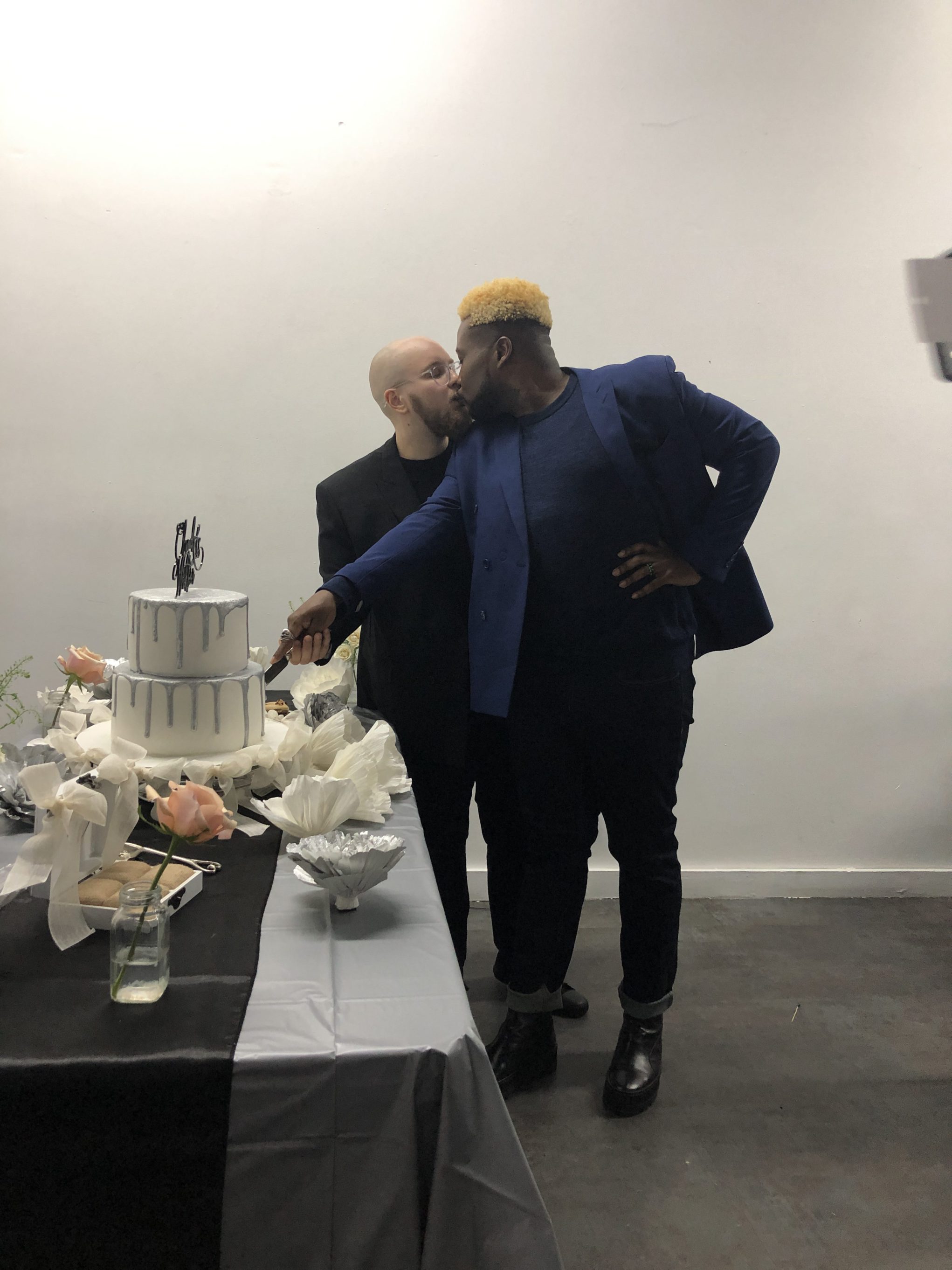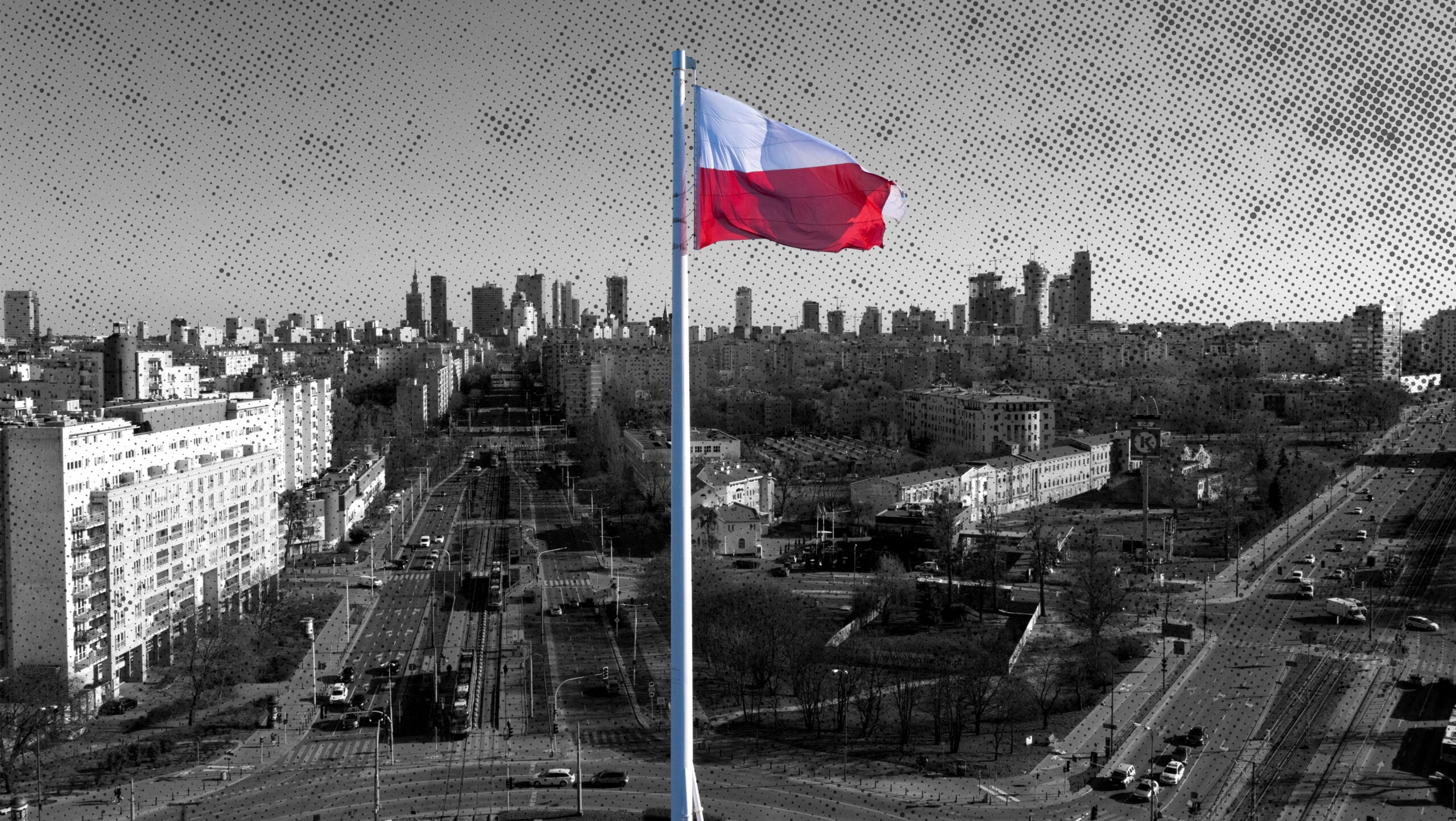There’s a scene in the fictional, dystopian television series The Handmaid’s Tale in which university professor Emily Malek tries to flee the totalitarian regime of the Republic of Gilead (the former United States) to Canada with her Canadian wife Sylvia and son Oliver. Sylvia and Oliver are allowed through the border, but Emily, an American, is stopped. As she tries to obtain the necessary permission to enter Canada, she is told a new law in Gilead means their marriage is no longer recognized, and she must stay behind.
Polish LGBTQ activist Bartosz Staszewski has been thinking about this scene recently. A similar situation is playing out right now in real-life Poland—a country that has imposed strict border controls in the fight against the spread of the novel coronavirus, or COVID-19. As an exception to the restrictions, any foreign nationals who are married to Polish citizens can enter the country.
But because Poland doesn’t recognize same-sex marriages, this doesn’t include LGBTQ people.
“It’s madness but it is true,” Staszewski says. “The first step on Polish soil, they are recognized as strangers.”
Poland has faced international notoriety in recent months for its stance on LGBTQ rights. Last year, the right-wing national conservative party Law and Justice held onto power in the Polish parliamentary elections after a campaign that focused on demonizing the country’s LGBTQ communities. Hostility toward LGBTQ people has since become more visible, with Pride marches attacked and LGBTQ symbols destroyed. Recently, many towns in Poland—across an area covering a third of the size of the country—also declared themselves LGBT-free zones, pledging to avoid promoting tolerance or funding organizations promoting LGBTQ rights.
And now, Staszewski says, the novel coronavirus outbreak and the efforts to contain it have exposed how the lack of protections for LGBTQ people in Poland worsen the impact of the pandemic.
“Under crisis, we clearly see that we are missing equal rights in Poland,” he says. “Equal rights are not just happy marriage and adoptions. It’s also a right to feel secure when something bad happens in our family, to feel secure under international or state crisis.”
Because same-sex relationships aren’t recognized, partners of LGBTQ people who become hospitalized in the country will not be seen as next-of-kin and won’t be able to find out about their loved one’s condition. “In practice, this means that a significant group of citizens and their families are not only discriminated against when it comes to basic protections and support offered by the state to families, but also have to cope with everyday problems that may seem absurd to people who are lucky enough to never face them,” says Hubert Sobecki, from the organization Mio Nie Wyklucza (Love Does Not Exclude). This, he adds, ranges from a lack of guaranteed access to medical records, to “having no right to even bury your de facto spouse.”
Polish ex-pat Wiktor Dynarski and their husband Claude, who is from Jamaica, are facing this issue firsthand. They have been married since January 2019 and currently live in New York City. Dynarski says they have not visited Poland since they have been together, as they are worried about the rising anti-LGBTQ attitudes there. But with the increased threat of COVID-19—particularly in New York City, where approximately five percent of the world’s cases have been reported—the couple considered leaving for Poland, where most of Dynarski’s family still live. Doing so would put Dynarski in a tough position: They would have to choose between returning to their family, or staying with their partner.
“As Poland does not recognize any form of same-sex unions, Claude and I would have been separated as he needs a visa to enter the Schengen Area,” a group of 26 European nations where citizens can travel without a passport, Dynarski says. They have not seen some members of their family for over a year; now, they may not be able to see them again for many months.

Wiktor Dynarski and their husband Claude on their wedding day. The pair considered returning to Poland from New York City during the COVID-19 pandemic, but opted not to in fears of being separated. Credit: Courtesy Wiktor Dynarski
Still, the couple has decided to stay in New York for the foreseeable future because of the border controls—and because, Dynarski says, they don’t want to contribute to the already rapid spread of COVID-19.
And even if they did manage to enter the country, LGBTQ couples face discrimination within Poland that has been exacerbated by the pandemic. At the beginning of March, a priest from the western city of Wrocaw allegedly said in mass that the virus was “punishment for the sins of abortion and homosexuality.”
Widespread outrage has erupted on social media in regards to the situation for LGBTQ couples trying to reach Poland: Polish Member of European Parliament Sylwia Spurek posted on Facebook that the border restrictions were preventing same-sex couples “from living a normal life,” citing an article of the Polish constitution that guarantees all citizens of Poland equality before the law. Spurek also called for the border restrictions to be amended—though, so far, there has been little sign from the government that the law would be changed.
And Polish LGBTQ rights organizations have also joined the fight. Ewa Miastkowska, from My, Rodzice (We, The Parents), which campaigns for LGBTQ equality from a family perspective, says the lack of regulations allowing same-sex marriage or partnerships “should be in itself considered inhumane and a violation of fundamental human rights.”
“Even now, when we are under a crisis, we feel like second-class citizens”
“The lack of formal regulations regarding LGBT families is especially difficult and pronounced in the times of global pandemic,” she adds. “With the border control back in place in the European Union, multinational families are afraid of being torn apart at the border as one of the parents or children can be denied entry into the country.”
But the fight does not stop in Poland. The pandemic has intensified the need for LGBTQ family rights across the globe. Earlier this month, an Israeli rabbi claimed COVID-19 was “divine punishment” for Pride parades. Meanwhile, in the U.S., Terry Stone, an evangelical preacher, said the virus was a punishment for same-sex marriage. And, in the Middle East, LGBTQ people under lockdown are facing being trapped with abusive families or experiencing loneliness without respite.
It’s a situation that could occur in Poland, too. “It will be a difficult year for us, especially after 2019 which brought homophobia and violence towards our community and LGBT-free zones,” says Magdalena Dropek, the former editor of the largest LGBTQ news outlet in Poland, Queer.pl, and the co-organiser of the Kraków Equality March. “We need our safe spaces, hope and Prides, but probably we will have to postpone or cancel them this year.”
Dropek says she is trying to create safe online spaces to support LGBTQ people who might face loneliness during self-isolation, spaces where they can access cultural recommendations or chat to new people.
But for some, there’s a feeling that Polish officials at the highest level should also be doing more, especially to keep families together at this critical time.
“Even now, when we are under a crisis, we feel like second-class citizens,” Bartosz Staszewski says. “We just want to feel secure in our own country—especially now.”


 Why you can trust Xtra
Why you can trust Xtra


